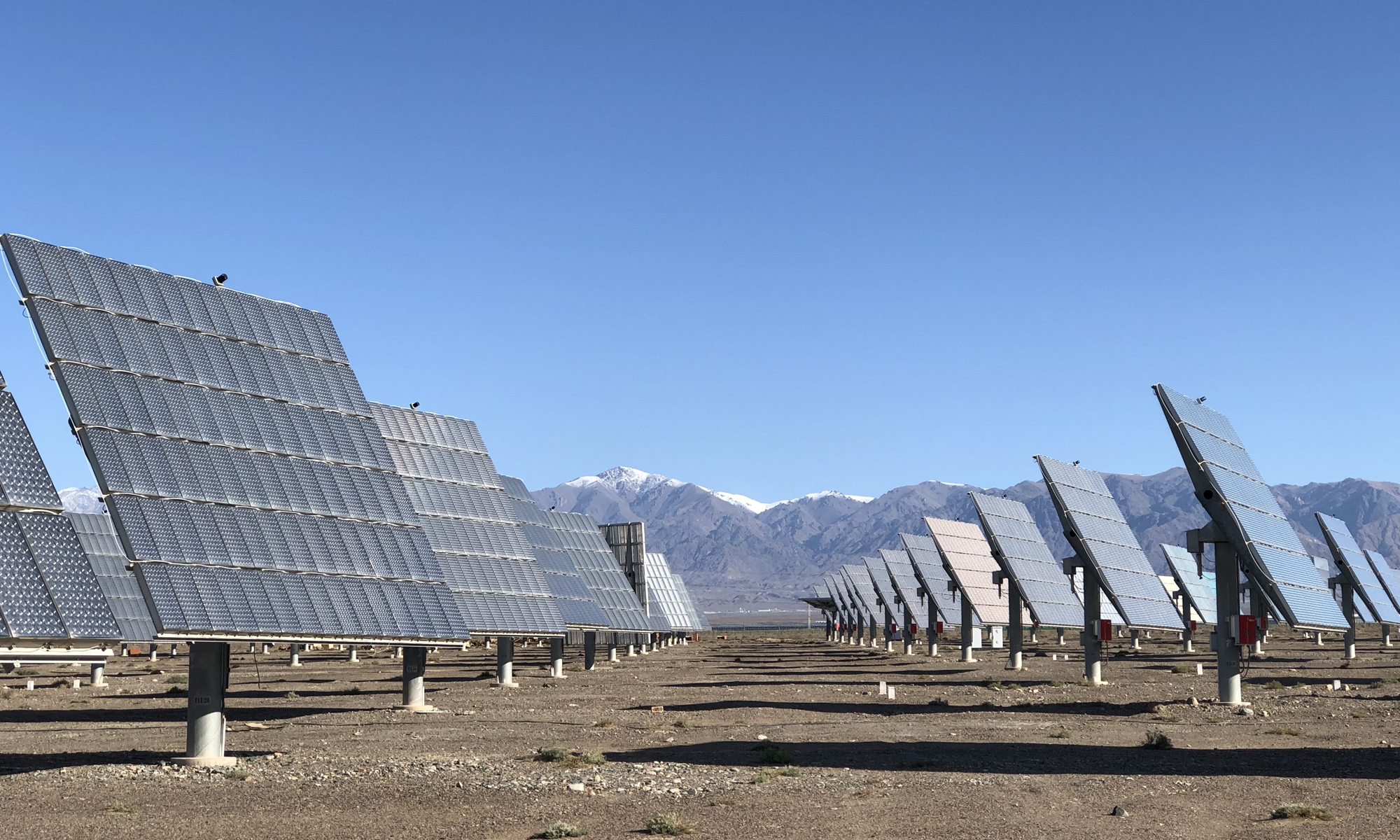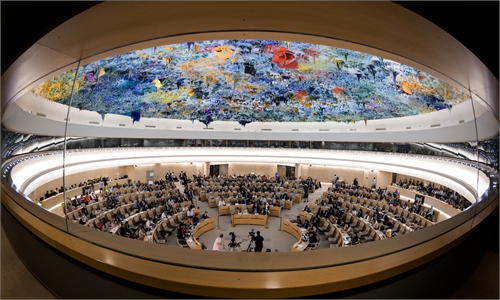US mulling ban on solar materials from Xinjiang exposes hypocrisy of human rights concerns
Politicians, industrial lobbyists work together to ambush China’s PV industries

Solar panels made by a company in Xinjiang's Hami. Photo: Liu Xin/GT
Canada, together with the US and a small group of Western countries, released a joint statement to hype topics on Northwest China's Xinjiang Uygur Autonomous Region on Tuesday, the second day of the 47th session of the United Nations Human Rights Council (UNHRC). Despite the inflammatory words used in the statement to show "concerns" over Uygurs in Xinjiang, media reports that the US is mulling new moves to attack Xinjiang's solar industries pushed by industrial lobbyists and politicians have torn down US' lies and exposed that the current hyping of Xinjiang topics is not about human rights, but only about geopolitics and US interests.
On Tuesday, Canadian Ambassador to the UN Leslie Norton read out a joint statement from a number of countries at the 47th session of the UNHRC, claiming that more than 1 million people have been "unlawfully" detained in China's Xinjiang and some "subjected to torture or forced labor," the Reuters reported.
This joint statement of the small group of Western countries led by the US was slammed by a joint letter given by Belarus on behalf of 65 countries, in which they expressed their support to China's stance and opposed interference in China's domestic affairs under the banner of "human rights."
Moreover, news came that the Biden administration is weighing a ban on the imports of solar panel raw material, a move that has been seen as the latest example to show how US politicians, industrial lobbyists, big companies and Western media have cooperated to hit other countries' leading industries by using the excuse of human rights concerns.
The Biden administration is considering a ban on the imports of solar panel raw material - polysilicon - from China's Xinjiang region, POLITICO reported on Monday, citing anonymous sources. The move would put Biden's aggressive climate change goals in danger as the US solar industry is planning a road map to increase the share of solar in overall US power generation to 20 percent by 2030, read the report.
The "genocide" allegations and accusations of "forced labor" in China's Xinjiang are a pack of barefaced lies and rumors with malicious purposes, Chinese Foreign Ministry spokesperson Zhao Lijian said at a routine press briefing on Tuesday.
Their real purpose is to oppress and contain the development of related companies as well as China's development - it is actually making forced unemployment, forced poverty and unfair competition, Zhao said, noting that China is closely watching the US moves and will make necessary countermoves to firmly safeguard its interests.
US struggle
Mulling the ban on products of solar industries from China has not come out of the blue. US companies have been working hard to ambush Chinese enterprises and recently they choose to use the excuse of "forced labor."
In a statement released on May 14, the Solar Energy Industries Association (SEIA), a US trade group, strongly urged companies to use a traceability protocol so they know the origin of the materials they are using and can take the necessary steps to move supply chains out of Xinjiang.
Chinese solar industry observers pointed out that any impacted US company which supposedly lost their edge to Chinese competitors may have become a supporter of the US ban which is being considered by the Biden administration.
Ignoring that Xinjiang polysilicon producer Xinjiang Daqo opened its plant's door to the West to showcase its automated production, some US politicians, media outlets and trade groups have promoted increased crackdowns on the region's solar sector - an industry in which US companies had an edge before China decided to develop its domestic PV sector.
But the past decade witnessed how the US solar industry went downhill while growth in China's solar energy sector forged ahead.
Since 2004, Chinese PV enterprises have succeeded in lowering the costs of solar modules from around 30 yuan to 2.5 yuan per watt.
According to the China Photovoltaic Industry Association, the country's PV supply could make tremendous contributions to the world's renewable energy transformation. China has 67 percent of the world's silicon raw material, 97 percent of wafers, 79 percent of solar cells and 71 precent of PV modules.
Take polysilicon, the raw material used in most solar panels. According to the latest ranking from German research firm Bernreuter Research, seven of the world's 10 largest polysilicon producers are based in China and only one is American.
Hemlock Semiconductor Group, the only US polysilicon producer named on the list, laid off about 400 workers in Tennessee and Michigan in 2013. The trade frictions between China and the US resulted in little gains for the company, as Chinese customers cannot afford the US tariffs, Phil Dembowski, the Michigan company's chief commercial officer, told the Wall Street Journal in October, 2020.
Lack of policy support and Trump's tariffs strategy have hurt the US solar sector badly. According to the SEIA in 2019, tariffs on imported solar cells and modules brought about the loss of more than 62,000 US jobs and $19 billion in new private sector investment.
In addition to the economic pains, US tariffs on solar products have led to the cancelation of 10.5 gigawatts (GW) of solar installations, enough to power 1.8 million homes and reduce 26 million metric tons of carbon emissions, the group noted.
After suffering from the huge losses, the US trade group, starting from 2020, targeted China's Xinjiang region, which contributes about 45 percent of the global polysilicon production.
However, from a practical perspective, the competitive prices of the Chinese solar panels as well as its strong industrial support ability would facilitate China to maintain its dominance in the global solar sector, and US PV manufacturers know this, a Chinese industry observer who asked to remain anonymous told the Global Times on Tuesday.
"Within one to two years, it will not be possible for the US to develop complete and mature industrial chains by itself," the observer said.
Political cooperation
After constant lobbying by enterprises, US politicians are busy piling on the rhetoric against China's solar industries, although with divergences on the development of renewable energy development in the US, Democrats and Republicans have reached consensus on containing China in this field, Zhu Ying, deputy director of the National Human Rights Education and Training Base of Southwest University of Political Science and Law, told the Global Times on Tuesday.
Compared with Republicans who have been long lobbied by traditional energy firms, Democrats are keen to promote solar and wind energy not only for the electoral politics but also for the interests of high-tech companies behind them.
The draft of the Democratic Party's 2020 platform, made public in July 2020, outlined a build-out of wind and solar energy that would far outpace current projections, calling for the installation of 500 million solar panels in the next five years alongside 60,000 new wind turbines.
"Unlike cotton-related industries, in which many Chinese companies are in the downstream of the industrial chain, China's solar industries have taken the top position of the global chain - this is especially unbearable for the Democrats who are advocating a new climate economy and carbon neutrality and are working so hard to be the bellwether of the field globally," Zhu said.
Democrats on the House Ways and Means Committee called on the Biden administration last week to block imports of Chinese solar panels and other products that contain polysilicon made in Xinjiang, according to the South China Morning Post.
Michigan Democrat Dan Kildee is one of the lawmakers pushing Biden to act, according to the POLITICO report. The state he represents is home to Hemlock Semiconductor.
Although the Republicans' motives in sanctioning China's solar industries may be to trigger Chinese countermeasures which would limit exports of polysilicon materials to the US, thus possibly hindering the expansion of new energy companies in the US, they are not willing to see quick development of China's solar sector, said industry insiders.
"It has become a bipartisan move in the US to attack China's solar industry. By using the lame excuse of 'forced labor' in the technology-intensive industry, the US not only wants to destroy Chinese companies' reputation but also grasp the dominant narrative," Zhu said.
"Cotton, the solar sector and the hyping of forced labor or genocide… nothing is about human rights or the concerns of Uygurs in China's Xinjiang. The US only cares about its own interests and geopolitics," said Zhu, noting that the US sanctions are actually strangling the right of the Uygurs to development.
The Global Times learned that more than 200 Uygurs from China's Xinjiang have been sacked as their companies, which have business ties with the US, want to avoid possible risks or sanctions from the US. Companies and individuals that have been affected by the "forced labor" hype and the ensuing US sanctions, including labor services companies, are preparing to sue individuals and think tanks that made and spread rumors and fake news.





